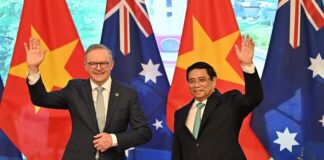GEORGE ORWELL wrote sport “is war minus the shooting”. The tension that exists between states gets expressed in and around sporting events and the Olympics are often a site of bitter wrangling between rivals.
It is in this context that we need to understand recent calls for Western politicians like Gordon Brown and Hillary Clinton to boycott the opening ceremony of the Beijing Olympics. They are vile hypocrites. While condemning China’s crimes in Tibet, Brown remains a leading figure in the brutal occupation in Iraq that has killed over one million people. Clinton has recently declared she’s prepared to “obliterate Iran”.
These politicians care nothing for ordinary Tibetans. They are giving voice to growing anxiety amongst the ruling class in their countries that China’s economic rise is a threat to their positions in the world economy. Similarly, Kevin Rudd’s public rebuke of Beijing’s abuses in Tibet was a carefully stage-managed affair. It was part of deliberate strategy to put some political distance between his government and Beijing and reassure key trading partners like Tokyo that old loyalties will not be forgotten.
The sermonising from Western governments reminds us of the way the US suddenly became a champion of Afghani self-determination after the Soviet invasion and called for a boycott of the 1980 Moscow games.
Five years after a military defeat in South East Asia that cost four million lives and reeling from the impact of the 1979 Iranian revolution, the US led a boycott of 65 nations in desperate bid to reclaim lost ideological ground in the Cold War.
The Olympic games have always been about nation building. When Empires and powerful nation states were establishing themselves, organised sport-the Olympics being the ultimate form-played an important role in giving people within particular borders a sense of who they were. Often the new identity was created elsewhere by another social class or another ethnic group. Cricket and the British Empire went hand in hand. Baseball became the national sport in Puerto Rico and Cuba as the US flexed its imperialist muscle in Central America. In 1936 Hitler used the Olympics to celebrate his racist and endlessly violent regime. And it was during these Olympics that the torch relay made its first appearance. The Nazis selected 3000 “pure” Aryan runners to relay the torch from Athens to Berlin.
Over the last 30 years the Olympics has taken on another powerful dimension by evolving into a huge franchise. The Sydney Olympics attracted US$492 million in corporate sponsorship. It is estimated that sponsorship for the Beijing Olympics will amount to US$1 billion. BHP has been granted the title of Official Diversified Minerals and Metals Sponsor.
Fair play, humility, camaraderie, equality are supposedly Olympic values but these are rarely present before or after the firing of the starter’s gun. The Olympics allow politicians to strut the world stage and pretend no one is suffering in their regime. Homes are demolished to make way for hideous stadiums and lives are lost building them.
Prior to the Olympics in Mexico the government shot dead hundreds of protesting students. The LA games took place against the backdrop of state executions. While competitors ran around the track in Sydney many indigenous people battled against third world conditions in one of the most prosperous nations on earth.
Resistance
But because they bring together thousands of people, the Olympics can also become the site of important moments of protest. Two black athletes raising gloved hands in 1968 to show their support for black uprisings in US cities was truly special. During the Sydney games, Aboriginal Rights activists erected a tent embassy in the city and gained international media attention and built momentum for their ongoing struggle for justice.
In the past few months, in total contrast to the profit driven objectives of Western leaders, thousands of people around the world have demonstrated against the torch relay in solidarity with the independence movement in Tibet, including major rallies in London, Athens, Paris, Tokyo, Jakarta, Seoul and Canberra. Since the Chinese invasion of 1953, Tibetans have suffered exclusion from the Han-Chinese dominated economy, brutality at the hands of the military and watched the destruction of the local environment.
We need to strengthen this struggle from below, drawing links between the repression in Tibet and the brutality of our own leaders to burst the Olympic bubble.
By Tim Erikson





